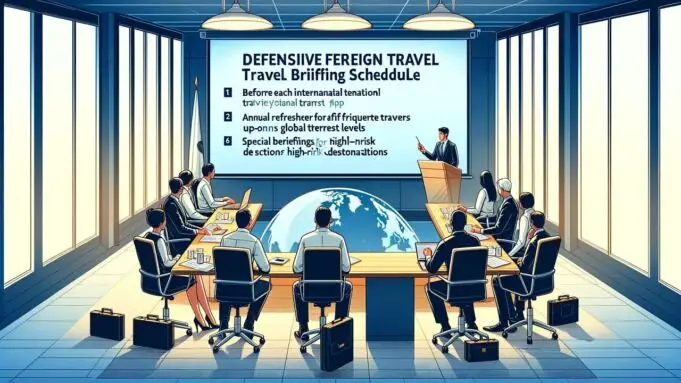Are you planning to travel abroad soon? If so, you may be wondering how often you need to receive a defensive foreign travel briefing. This crucial security measure is designed to ensure that you have the information you need to stay safe and comply with agency policy while traveling outside the country.
Before we dive into the details, let’s take a moment to address the importance of foreign travel briefings. When traveling outside the country, it’s crucial to be aware of the potential risks and challenges you may face. From information security to personal safety, there are many critical factors to consider. By receiving a briefing before your trip, you can ensure that you have the knowledge and tools you need to stay safe and comply with agency policy while abroad.
So, how often must you receive a defensive foreign travel briefing? In this blog post, I’ll address this critical question and provide you with the information you need to stay informed and prepared. Whether you’re a seasoned traveler or a first-time flyer, this guide is designed to help you navigate the complex world of foreign travel with confidence and ease.
Why Are Defensive Foreign Travel Briefings Important?
Defensive foreign travel briefings are important to ensure your safety and minimize risks during international trips. These briefings are part of a security program designed to prevent unauthorized access to classified information and secure Department personnel and facilities. As a result, it is important to ensure that you receive these briefings before traveling abroad.
The Department of Defense (DoD) annual security awareness training requires that all personnel receive a defensive foreign travel briefing before traveling outside the United States. This briefing is designed to provide you with the appropriate level of security awareness to ensure that you are prepared for the potential risks associated with foreign travel.
By understanding these risks, you can take appropriate steps to mitigate them and ensure your safety while traveling abroad.

When Should You Get Your First Briefing?
According to the Foreign Travel Briefing Program policy, all Departmental personnel, including summer hires, those on temporary assignment, and contractors, are required to receive an initial defensive foreign travel briefing before their first foreign travel.
This initial briefing is designed to provide you with a basic understanding of the potential risks and threats associated with foreign travel, as well as the steps you can take to minimize those risks and protect yourself while you are away.
During your initial briefing, you will learn about a wide range of topics, including travel safety, local customs and culture, health and medical issues, and emergency procedures. You will also receive information about the resources available to you, such as the Foreign Travel Briefing Program, which can provide you with additional support and guidance as needed.
READ: EF Ultimate Break Reviews
How Often Should You Receive a Foreign Travel Brief?
When planning a journey abroad, it is essential to have a clear understanding of the potential risks and challenges that may arise. A foreign travel briefing is a critical tool that can help you prepare for these challenges and ensure that you are ready to handle any situation that may arise.
So, how often should you receive a foreign travel briefing? The frequency of these briefings will depend on several factors, including the destination, the travel frequency, and any significant life changes or circumstances.
For example, if you are traveling to a high-risk area, you may need to receive more frequent briefings to stay up-to-date on the latest developments and potential threats. Similarly, if you are a frequent traveler, you may need regular updates to stay informed about changing trends and risks.
It is also important to note that foreign travel briefings should be updated regularly to reflect any changes in the security situation or other relevant factors. This may include updates on local laws and regulations, cultural norms and customs, and other important information that can help you navigate your destination safely and effectively.
Eligibility and Requirements for Receiving Briefings
To be eligible for the briefing, you must be Departmental personnel planning to travel abroad. The briefing is usually given annually, and it is mandatory for all individuals returning from travel of 90 days or more to undergo a security debriefing upon their return to the United States.
The personnel security program establishes the policy for the briefing, which includes the following requirements:
- Receiving a travel threat briefing from an antiterrorism officer
- Completing any necessary training requirements, which may include Survival, Evasion, Resistance, and Escape (SERE) training within 36 months of travel
- Completing all requirements before travel and beginning to complete the requirements 45-60 days in advance
The frequency of receiving a defensive foreign travel briefing depends on various factors, including your role, the nature of your travel, and the policies of the organization you work for. You should check with your supervisor or the personnel security program to determine the frequency of the briefing for your specific situation.
It is crucial to understand that there is no one-size-fits-all solution in the briefing. The briefing is customized based on the risks specific to your destination and your particular travel plans. To guarantee that you get the proper briefing, you must give the personnel security program as much information as you can.

Frequency of Mandatory Briefings
The policy mandates that at least once a year, a defensive foreign travel briefing be given.
This means that if you are a frequent traveler, you must receive a briefing before each trip. It is important to note that this policy applies to all personnel, regardless of rank or position. Whether you are a seasoned globetrotter or a first-time traveler, the frequency of mandatory briefings remains the same.
In addition to the annual briefing, it is also important to receive an update if there are changes in the security situation of the country you visit. Some programs may require additional briefings for personnel traveling to high-risk areas. These briefings may cover cultural differences, local laws and customs, and emergency procedures.
READ: Why Travel Influencers Should Use Stock Footage in Social Media Content?
Types of Defensive Foreign Travel Briefings
It is crucial for travelers to be aware of the different kinds of defensive foreign travel briefings that are accessible to them. When you travel overseas, these briefings help you stay safe and secure. You might come across the following kinds of defensive foreign travel briefings:
- In-person briefings: These briefings are conducted in person and are usually held at your workplace or a designated location. They are typically led by a security expert who will provide information on the potential risks and hazards of travelling abroad.
- Online briefings: Online briefings are becoming increasingly popular due to convenience. They can be accessed from anywhere with an internet connection and are often self-paced. However, in-person briefings are recommended for a more comprehensive understanding of the content.
- Pre-travel briefings: These are conducted before you depart on your trip. They are designed to provide information on your destination’s specific risks and hazards.
- Post-travel debriefings: These briefings are conducted after you return from your trip. They are designed to allow you to share your experiences and identify any areas where improvements can be made to the travel policy or program.
It is significant to remember that the program or travel policy may have an impact on how frequently these briefings are held. Annual briefings might be necessary for certain organizations but might be needed more regularly for others. It is crucial to inquire with your employer about the particular requirements that apply to your company.
Pre-Travel Briefing Content
Before foreign travel, it is crucial to receive a pre-travel briefing to ensure your safety and security. The briefing content typically covers a range of topics, including destination-specific information, travel security awareness, and policies and procedures related to foreign travel.
The briefing may cover important information about the country you are visiting, such as the political climate, local customs, and cultural norms. It may also provide information about potential risks and hazards associated with travel, such as natural disasters, disease outbreaks, and civil unrest.
In addition to destination-specific information, the briefing may include general travel security awareness training. This may cover personal security, information security, and emergency response procedures. The briefing may also guide how to avoid becoming a target of theft, kidnapping, or other crimes while traveling.
Lastly, the briefing might go over rules and regulations about international travel, like documentation needs, limitations on travel, and security clearance processes. It might also include details on the Foreign Travel Briefing Program, which aims to lessen Department employees’ susceptibility to hostile foreign information-gathering operations.
READ: Why Put a Crayon in Wallet While Traveling?
Post-Travel Debriefing Procedures
If you have recently traveled abroad, following the proper post-travel debriefing procedures is important. This will help ensure that you comply with the relevant policies and programs related to foreign travel briefing.
One of the most important steps you should take after returning from foreign travel is to report any incidents or issues during your trip. This may include any security concerns, such as suspicious activity or potential threats, as well as any compliance issues related to your travel. Reporting these incidents promptly can help prevent any further issues from arising and can also help improve the overall effectiveness of the foreign travel briefing program.
Another important aspect of post-travel debriefing is to review any relevant policies or procedures related to your travel. This may include reviewing the relevant foreign travel briefing policies and procedures and any other relevant compliance requirements or reporting procedures.
By reviewing these policies and procedures, you can ensure that you remain in compliance with all relevant requirements and can also help identify any areas where improvements may be needed.
Finally, take the time to reflect on your travel experience and to identify any areas where you may have learned something new or gained valuable insights. This may include reflecting on any cultural differences or challenges you encountered during your trip and any new skills or knowledge you gained. By taking the time to reflect on your travel experience, you can help ensure that you are better prepared for any future travel and can also help improve the overall effectiveness of the foreign travel briefing program.
Are Online Briefings Effective?
Yes, online briefings can be effective for receiving a defensive foreign travel briefing. Many organizations offer online briefings for convenience, and they can be a good option for those who cannot attend an in-person session. Online briefings can cover the same material as in-person sessions, including information on health risks, vaccinations required for your destination, and cultural differences.
However, in-person sessions are recommended for a more comprehensive understanding of the briefing material. In-person sessions allow for questions and discussion, which can help clarify any confusion or misunderstandings. Additionally, in-person sessions allow interaction with the briefing instructor and other attendees, which can benefit networking and building relationships.
It is important to note that not all online briefings are equal, and some may be less effective than others. When choosing an online briefing, it is important to ensure that it is from a reputable source and covers all the necessary material. It is also important to ensure that the briefing is up-to-date and complies with current policy and program requirements.
Special Considerations for High-Risk Regions
When traveling to high-risk regions, it is important to take special considerations to ensure your safety and security. High-risk regions are known for their dangerous conditions, such as political instability, conflict, terrorism, or crime. These regions are often subject to travel advisories issued by the US Department of State, which recommend avoiding non-essential travel or prohibiting travel altogether.
If you must travel to a high-risk region, it is essential to have a comprehensive travel policy that outlines the security measures and protocols you should follow. Your travel policy should include information on the destination, such as its political situation, crime rate, and health risks. It should also guide in preparing for your trip, such as obtaining the necessary visas, vaccinations, and insurance.
In addition, you should take extra precautions when travelling to high-risk regions. These precautions may include avoiding public demonstrations or gatherings, staying in secure accommodations, and keeping a low profile. You should always be aware of your surroundings and be prepared to respond to emergencies.
To ensure your safety in high-risk regions, it is recommended that you receive a defensive foreign travel briefing before your trip. This briefing should provide you with information on the specific risks and threats in the region and practical advice on how to stay safe. You should also receive regular updates on the security situation in the region throughout your trip.
READ: Luxury Travel Blog Holiday Inspiration Turquoise Holidays
Consequences of Non-Compliance
Compliance with the Department of Defense (DoD) Annual Security Awareness Refresher program is critical for maintaining sensitive information’s security and ensuring personnel’s safety during foreign travel. Failure to comply with this policy can result in severe consequences, including disciplinary action, loss of clearance, and even criminal charges.
Non-compliance with the DoD Annual Security Awareness Refresher program can lead to security breaches that compromise personnel safety and sensitive information. This can significantly damage the organisation’s reputation, loss of trust from stakeholders, and financial losses.
To ensure compliance with the program, the DoD has implemented a travel briefing program that provides personnel with the necessary information to stay safe and secure while travelling abroad. This program includes briefings on personal security, information security, and other critical areas of concern.
Note that participation in the DoD Annual Security Awareness Refresher program is mandatory. Employees who don’t follow the program can face disciplinary action, including suspension, loss of clearance, or even termination. Criminal charges may arise in certain instances of non-compliance.
Common Misconceptions About Travel Briefings
There are widespread misconceptions regarding defensive foreign travel briefings. Below are a handful of them:
“I don’t need a travel briefing because I’m just going on vacation.” This is a common misconception. Even if you’re just going on vacation, you must know the potential risks of travelling to a foreign country. Travel briefings can help you understand the local customs, laws, and potential dangers, which can help you stay safe during your trip.
“I already had a travel briefing, so I don’t need another one.” This is not true. Travel briefings are not a one-time thing. You need to have them every time you travel to a foreign country. This is because the situation in the country you’re travelling to can change, and new risks may arise.
“I don’t need to worry about security because I’m just going to a safe country.” This is a dangerous misconception. No country is completely safe, and even the safest countries can have risks associated with them. Travel briefings can help you understand the potential risks and how to avoid them.
“I don’t need to worry about security because I’m travelling with a group.” This is another dangerous misconception. Just because you’re travelling with a group doesn’t mean you’re immune to risks. In fact, travelling with a group can sometimes make you more of a target. Travel briefings can help you understand the potential risks and how to avoid them, regardless of whether you travel alone or with a group.
READ: Best Time to Visit San Antonio
Self-Education vs. Professional Briefings
Regarding staying up-to-date on foreign travel briefing policies, there are two main options: self-education and professional briefings. Self-education involves studying independently, using resources such as government websites, security awareness programs, and flashcards like those found on Quizlet. On the other hand, professional briefings are typically provided by your employer or a government agency and are more formal.
Self-education can be a great option for those who prefer to learn at their own pace and on their own schedule. It can also be a good choice for those unable to attend professional briefings due to scheduling conflicts or other reasons.
On the other hand, professional briefings are typically more comprehensive and provide a more in-depth understanding of foreign travel briefing policies and procedures. They are also a good choice for those who may be unsure of what information they need or need additional guidance on specific topics.
The table below provides a comparison of self-education vs. professional briefings:
| Self-Education | Professional Briefings | |
| Schedule | Self-paced | Scheduled |
| Format | Self-study | Formal presentation |
| Comprehensiveness | May not be as comprehensive | More comprehensive |
| Guidance | Limited | More guidance provided |
| Applicability | May not be sufficient for those in sensitive positions | Applicable to all positions |
| Availability | Always available | May not be available at all times |
Whichever option you select, it is imperative that you keep up with foreign travel briefing policies to preserve security awareness and safeguard classified information.
Additional Resources and Support
There are a variety of resources available to help you prepare for your trip and ensure that you receive the necessary briefing. For example, the U.S. Department of Commerce offers a Foreign Travel Briefing Program that applies to all Department bureaus, offices, employees, contractors, subcontractors, licensees, certificate holders, grantees, experts, and consultants who have access to Classified National Security Information (CNSI) or who hold positions with clearances or are in a sensitive position.
In addition to the Department of Commerce, the Department of Defense (DoD) also offers an Annual Security Awareness Refresher course that covers various topics related to foreign travel, including the need for defensive briefings. The DoD course emphasizes that you must receive a defensive foreign travel briefing at least once a year and that you should ensure that your Antiterrorism/Force Protection Level 1 training is current before traveling.
Other resources that may be helpful include the State Department’s travel advisories and the Centers for Disease Control and Prevention’s recommendations for international travel. Reviewing these resources carefully and taking appropriate precautions to ensure your safety and security while traveling is important.
Remember, receiving a defensive foreign travel briefing is an important step in preparing for international travel. By taking advantage of your available resources and staying informed about potential risks and threats, you can help ensure a safe and successful trip.
READ: West Coast Road Trip
Frequently Asked Questions (FAQs)
What are the requirements for receiving a defensive foreign travel briefing?
To receive a defensive foreign travel briefing, you must be personnel traveling abroad, either officially or unofficially, to foreign countries, professional meetings, or conferences where foreign attendance is likely. It is also important to note that personnel traveling to locations with concerns about possible foreign intelligence exploitation must also receive a defensive foreign travel briefing.
How frequently are personnel required to undergo briefings on defensive foreign travel?
The frequency of defensive foreign travel briefings depends on several factors, such as travel frequency, destination-specific briefings, and life changes and circumstances. You should attend a defensive foreign travel briefing at least once a year and more frequently if your travel patterns or destination countries change.
What steps should be taken before traveling to a foreign country for security purposes?
Before traveling to a foreign country for security purposes, you should research the country’s political climate, safety and security conditions, and cultural norms. You should also register your trip with the embassy or consulate of your home country in the destination country and ensure that you have adequate medical insurance coverage for the duration of your trip.
What are the consequences of failing to adhere to foreign travel security protocols?
Failing to adhere to foreign travel security protocols can result in serious consequences such as loss of sensitive information, injury, or even death. Taking all necessary precautions to ensure your safety and security while travelling abroad is important.
What information is typically covered in a defensive foreign travel briefing?
A defensive foreign travel briefing typically covers topics such as cultural awareness, personal safety and security, emergency response procedures, and handling classified information. The briefing may include country-specific information such as local laws, customs, and potential risks.
What security measures must be completed when handling classified information during foreign travel?
When handling classified information during foreign travel, you must ensure that all necessary security measures are in place to protect the information. This may include using secure communication channels, storing the information in a secure location, and limiting access to only authorized personnel. It is also important to follow all applicable security protocols and procedures.
Conclusion
Receiving a defensive foreign travel briefing before embarking on any international trip is crucial for personal safety and minimizing risks. The frequency of these briefings may vary depending on factors such as destination, travel frequency, life changes, and current events.
You can find these briefings from various sources, including government websites, travel agencies, and security consultants.
Remember to stay informed about the potential risks during travel, understand the importance of situational awareness, and learn how to mitigate vulnerabilities and protect personal information. By taking the necessary precautions, you can ensure a safe and enjoyable trip.
So, before you pack your bags and head out to your next adventure, make sure you receive a defensive foreign travel briefing.










![What Does Aviates Stand for in Aviation? [The Art of Flying] Aviates](https://tourinplanet.com/wp-content/uploads/2024/07/Aviates-100x75.jpg)














![25 Best Peruvian Foods You Must Try In Peru [With Recipes] Peruvian Food](https://tourinplanet.com/wp-content/uploads/2024/07/Peruvian-Food-100x75.jpg)


